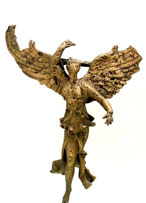| Author | |
|---|---|
| Epoch | 1922-2002 |
| Work | *** (As once uttered by Plato – humoresque), (Murman Lebanidze, Works in Two Volumes, Vol. 1, preface by Publishing House, Tbilisi, 1989) |
| Type | |
| Quote | “As once uttered by Plato, […] No one lives without fear! […] And again Plato said: Although [human life is] under fear [of imminent death], The human life is impossible without courage, Courage – is overcoming fear. I too, like Plato, Had the courage with fear, I was rearing sorcery of courage in my soul – And I think I did it, Still – being is permeated with fear, The smell of fear is acrid, And the breed of people lives under fear, - Anyhow.” (pg. 430) |
| Term |
|

| Comment | Quite a few of Murman Lebanidze’s poems are saturated with a philosophical motive of a human being and concretely of the poet, preparing himself “to meet” death. (To illustrate this, it is enough to recall one of his poems, written in 1984 - “I am not afraid of tiger or lion”… “I am not afraid of death that / awaits every human being”). The poem under consideration is also based on this thematic motive: despite the thing, that the author does not specify in it what kind of fear he is talking about, it is clear that the only kind of fear “the human being lives with”, the fear which daunts human life, is the fear of imminent death at the end of life, felt by each person. It is noteworthy, that author mentions Plato three times in this comparatively small, seven-stanza humoresque, which allows to conclude, that this verse by Murman Lebanidze definitely reflects one of the more or less famous expressions by Plato. An idea, that a self-respecting person must not be afraid of death, is found in quite a number of Plato’s works and is one of the main provisions of the Greek philosopher’s ethical concept. E.g., at the beginning of his third book of “the State” (386 ab) Plato formulates the following opinion through Socrates’ mouth: „If they are to be brave, must we not extend our prescription to include also the sayings that will make them least likely to fear death? Or do you suppose that anyone could ever become brave who had that dread in his heart?” [translated by Paul Shorey]. And yet, it is to be surmised, that the main literary source of Murman Lebanidze’s words - “Courage – is overcoming fear. I too, like Plato, / Had the courage [together] with fear” – is Plato’s other, no less well known dialogue “Phaedo”, in which, as it is known, Socrates provides a number of arguments to his disciples before his suicide, to prove immortality of soul. Before that, at the beginning of the argumentation (Chapter XIII) he says, that short of philosophers, bravery of people, also of the seemingly bold men faced with death, is illusory, as it hinges on fear: “Brave men face death—when they do face it—through fear of greater evils” [...] “Then all except philosophers [when they do face death] are brave through fear” [68d, - translated by Harold North Fowler]. According to Plato, in Socrates’ opinion: ”[…] that which is called courage is especially characteristic of philosophers” [68c, - translated by Harold North Fowler]. As “the true philosophers practice dying, and death is less terrible to them than to any other men“, because the true philosopher „confidently believes that he will find pure wisdom nowhere else than in the other world” [XII, 68b, - translated by Harold North Fowler]. Taking into consideration the abovementioned paragraphs it becomes clear, that the main literary source of Murman Lebanidze’s verse to be discussed is Plato’s “Phaedo”, as well as that the poet periphrases, transforms Plato’s / Socrates’ point of view, putting it in a style characteristic of humoresque, though at the same time retaining its essence [Z. K.] |
|---|

